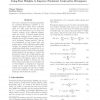Free Online Productivity Tools
i2Speak
i2Symbol
i2OCR
iTex2Img
iWeb2Print
iWeb2Shot
i2Type
iPdf2Split
iPdf2Merge
i2Bopomofo
i2Arabic
i2Style
i2Image
i2PDF
iLatex2Rtf
Sci2ools
135
click to vote
ICML
2009
IEEE
2009
IEEE
Using fast weights to improve persistent contrastive divergence
The most commonly used learning algorithm for restricted Boltzmann machines is contrastive divergence which starts a Markov chain at a data point and runs the chain for only a few iterations to get a cheap, low variance estimate of the sufficient statistics under the model. Tieleman (2008) showed that better learning can be achieved by estimating the model’s statistics using a small set of persistent ”fantasy particles” that are not reinitialized to data points after each weight update. With sufficiently small weight updates, the fantasy particles represent the equilibrium distribution accurately but to explain why the method works with much larger weight updates it is necessary to consider the interaction between the weight updates and the Markov chain. We show that the weight updates force the Markov chain to mix fast, and using this insight we develop an even faster mixing chain that uses an auxiliary set of ”fast weights” to implement a temporary overlay on the energy la...
| Added | 19 May 2010 |
| Updated | 19 May 2010 |
| Type | Conference |
| Year | 2009 |
| Where | ICML |
| Authors | Tijmen Tieleman, Geoffrey E. Hinton |
Comments (0)

